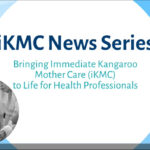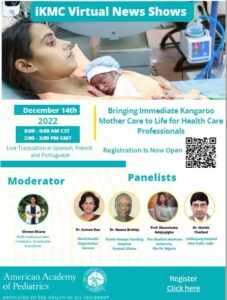
The American Academy of Pediatrics (AAP), a professional membership organization of more than 67,000 pediatricians and child health experts, seeks to attain optimal physical, mental, and social health and well-being for ALL infants, children, adolescents, and young adults around the world. By engaging diverse sets of child health care providers, the AAP promotes evidence-based, adaptive population health policies and delivers essential interventions to help address the world’s most pertinent and emerging concerns for children in all settings.
What we do
AAP Global works to improve newborn and child survival globally by:
- Providing technical assistance to professional associations, and civil society to improve immunization systems, newborn care best practices, quality improvement, and early childhood development
- Partnering with non-traditional stakeholders to evaluate life-saving technologies for newborns and children, implement sustainable programs, and improve service delivery
- Developing evidence-based clinical educational programs and tools for newborn and child health to build capacity of health care providers, improve quality of care, and strengthen health systems
Our Programs
Helping Babies Survive (HBS) – a suite of evidence-based, hands-on training programs developed to reduce neonatal mortality in resource-limited environments. Together, the HBS programs ensure that birth attendants have the necessary skills and competencies to provide high-quality care to newborns after birth. HBS programs have been introduced in more than 80 countries with more than 1 million providers trained and equipped.
- Helping Babies Breathe (HBB) teaches the basic management of neonatal resuscitation, with a focus on quick identification of an asphyxiated newborn and getting the baby to breathe within the first minute after delivery. Studies have shown that HBB can reduce early neonatal mortality by up to 50%.
- Essential Care for Every Baby (ECEB) teaches essential newborn care practices from birth to time of discharge from the facility, which includes skin-to-skin care, initiation and maintenance of breastfeeding, assessing danger signs, and proper referral procedures.
- Essential Care for Small Babies (ECSB) teaches the special care needed to support small or premature babies, which includes alternative breast milk feeding options, thermal regulation, infection prevention, stabilization of baby for transport, and home care guidance.
Essential Newborn Care (ENC) Now! – now, more than ever, we need flexible, remote solutions to ensure safe and effective capacity-building opportunities for health care workers. Developed in collaboration with Laerdal Global Health, ENC Now! is an innovative digital training package that supports remote facilitation of the second edition of the WHO Essential Newborn Care (ENCC) Basic Course on an online platform. ENC Now! features a blended learning approach, with digitally delivered content as well as face-to-face practice time.
The WHO ENCC Basic Course incorporates all content of the HBS courses, updated to align with WHO recommendations and guidelines. The ENCC Basic Course is made up of two parts – ENC 1, called Immediate Care and Helping Babies Breathe at Birth, which is an updated version of HBB, focuses on newborn care from birth to 60 minutes after birth, and ENC 2, called Assessment and Continuing Care, is an updated version of ECEB + ECSB, focusing on care between 60 minutes after birth to discharge.
CRISP – after more than a decade since the launch of HBB in 2010, we know that a single training experience is not enough to sustainably reduce newborn mortality. For this reason, the AAP has developed CRISP, a Customized mentoRship and Implementation Support Package that supplements training with evidence-based strategies to ensure education impacts practice. CRISP is a comprehensive package that includes online WHO ENCC training (ENC Now!) plus supplemental mentorship sessions and resources on topics to support implementation as well as retention of knowledge and skills.

